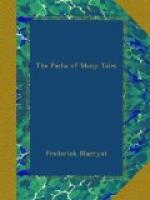* * * * *
“That’s not quite so uncommon a method of getting on in the world as you may imagine,” observed Mustapha, drily.
“Mustapha,” said the pacha, almost gasping, “all these are words, wind—bosh. By the fountains that play round the throne of Mahomet, but my throat feels as hot and as dry with this fellow’s doubts, as if it were paved with live cinders. I doubt whether we shall be able ever to moisten it again.”
“That doubt, your sublimity ought to resolve immediately. Hudusi, murakhas—my friend, you are dismissed.”
Hardly had the doubter gathered up his slippers, and backed out from the presence, when the pacha and his minister were, with an honest rivalry, endeavouring to remove at once their doubts and their thirst, and were so successful in their attempts, that they, in a short time, exchanged their state of dubiety into a very happy one of ebriety.
Chapter XVI
The next morning the pacha and his minister, after the business of the divan, with their heads aching from the doubts of Hudusi, or the means that they had taken to refute them, in not the best humour in the world listened to the continuation of them as follows:—
* * * * *
I have heard it observed, continued Hudusi, that the sudden possession of gold will make a brave man cautious, and he who is not brave, still more dastardly than he was before. It certainly was the case with me; my five hundred pieces of gold had such an effect, that everything in the shape of valour oozed out at my fingers’ ends. I reflected again, and the result was that I determined to have nothing more to do with the business, and that neither the sultan nor the pacha should be the better for my exertions. That night we made a sally; and as I was considered a prodigy of valour, I was one of those who were ordered to lead on my troop. I curled my moustachios, swore I would not leave a janissary alive, flourished my scimitar, marched out at the head of my troop, and then took to my heels, and in two days arrived safely at my mother’s house. As soon as I entered, I tore my turban, and threw dust upon my head, in honour of my father’s memory, and then sat down. My mother embraced me—we were alone.
“And your father? Is it for him that we are to mourn?”
“Yes,” replied I, “he was a lion, and he is in Paradise.”
My mother commenced a bitter lamentation; but of a sudden recollecting herself, she said, “But, Hudusi, it’s no use tearing one’s hair and good clothes for nothing. Are you sure that your father is dead?”
“Quite sure,” replied I. “I saw him down.”
“But he may only be wounded,” replied my mother.
“Not so, my dearest mother, abandon all hope, for I saw his head off.”
“Are you sure it was his body that you saw with the head off?”




